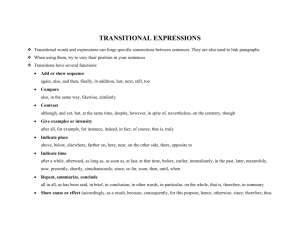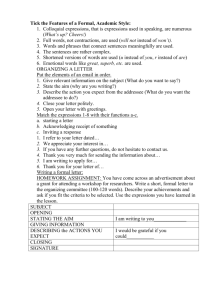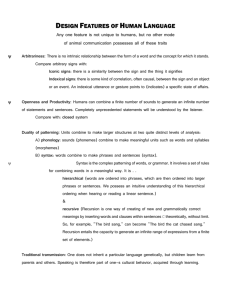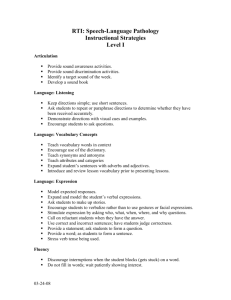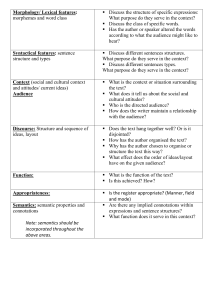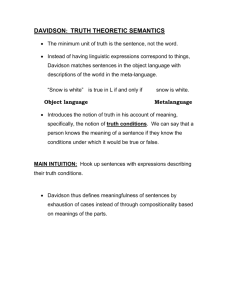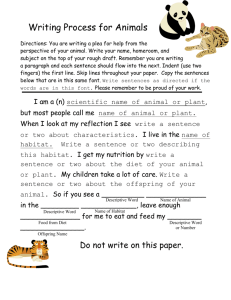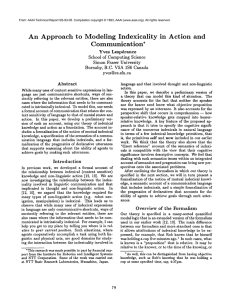PHILOSOPHY OF LANGUAGE
advertisement
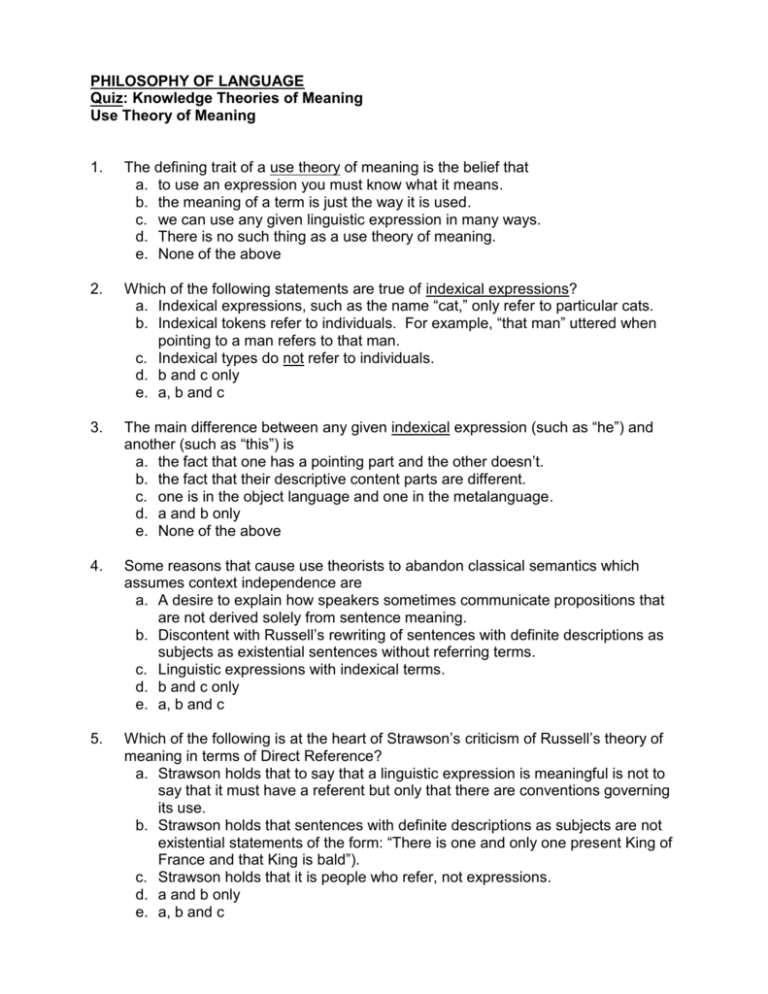
PHILOSOPHY OF LANGUAGE Quiz: Knowledge Theories of Meaning Use Theory of Meaning 1. The defining trait of a use theory of meaning is the belief that a. to use an expression you must know what it means. b. the meaning of a term is just the way it is used. c. we can use any given linguistic expression in many ways. d. There is no such thing as a use theory of meaning. e. None of the above 2. Which of the following statements are true of indexical expressions? a. Indexical expressions, such as the name “cat,” only refer to particular cats. b. Indexical tokens refer to individuals. For example, “that man” uttered when pointing to a man refers to that man. c. Indexical types do not refer to individuals. d. b and c only e. a, b and c 3. The main difference between any given indexical expression (such as “he”) and another (such as “this”) is a. the fact that one has a pointing part and the other doesn’t. b. the fact that their descriptive content parts are different. c. one is in the object language and one in the metalanguage. d. a and b only e. None of the above 4. Some reasons that cause use theorists to abandon classical semantics which assumes context independence are a. A desire to explain how speakers sometimes communicate propositions that are not derived solely from sentence meaning. b. Discontent with Russell’s rewriting of sentences with definite descriptions as subjects as existential sentences without referring terms. c. Linguistic expressions with indexical terms. d. b and c only e. a, b and c 5. Which of the following is at the heart of Strawson’s criticism of Russell’s theory of meaning in terms of Direct Reference? a. Strawson holds that to say that a linguistic expression is meaningful is not to say that it must have a referent but only that there are conventions governing its use. b. Strawson holds that sentences with definite descriptions as subjects are not existential statements of the form: “There is one and only one present King of France and that King is bald”). c. Strawson holds that it is people who refer, not expressions. d. a and b only e. a, b and c 6. According to Quine’s view of meaning a. meaning is captured by stimulus meaning, which is the set of affirmative and negative stimulus meaning pairs. b. meaning is captured by stimulus meaning, which corresponds to individual words. c. meaning is captured by stimulus meaning, which corresponds to sentences. d. a and b e. a and c 7. Quine arrives at Meaning Nihilism because, according to him a. radical translation does not succeed, that is, someone without any knowledge of a language cannot come up with a rule set, such that there is no rule set and, hence, no meaning. b. sentences with indexical expressions have a context dependent component c. stimulus meaning does not capture meaning in the intuitive sense and, since stimulus meaning is the only thing that could, there can be no meaning. d. a and c e. None of the above 8. The Descriptivist Fallacy is the assumption that a. all meaningful expressions are sentences that are true or false b. we can account for sentences with definite descriptions by translating them into existential sentences. c. the meanings of many linguistic expressions are context dependent. d. the meanings of many linguistic expressions are context independent. e. none of the above 9. A performative is a. There is no such thing as a performative. b. any utterance that is true or false. c. an utterance that only commits the speaker to its truth or falsity. d. an utterance that does what it does not by expressing a truth value but as a certain kind of convention-governed action. e. None of the above 10. According to Searle and Austin, the basic unit that must be accounted for by theories of meaning is a. Sentence meaning. b. Individual verb phrases. c. Individual noun phrases. d. The speech act. e. None of the above EXTRA CREDIT: 11. Assuming a two component theory of indexicals akin to that described by Stainton, how could a philosopher of language capture the descriptive content part? a. A thing theorist could explain the descriptive content part by assigning it to some individual in the world. b. A possible world semanticist might explain the meaning of the descriptive content part as a function from possible worlds to truth values (for example, the descriptive content part of the word “here” would be a function from objects at that location to the truth value of TRUE). c. A proponent of an Idea Theory of Meaning would say that meaning of the descriptive content part of an indexical would lie in its connection to something mental. d. a and c only e. a, b and c
